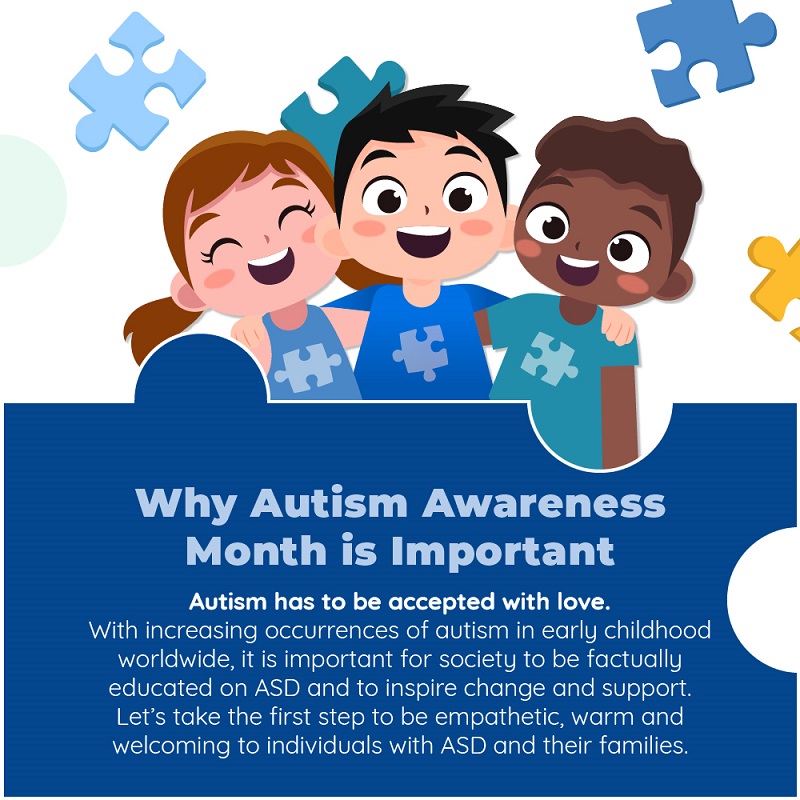April is Autism Awareness Month, and we dedicate this article to promote acceptance, understanding, and inclusion of individuals with autism. In Singapore, one in 150 children has autism.
Studies have shown that the public perception of autism revealed that autistic children are generally judged in a less favourable light. Some people with autism may hit, yell, or hurt themselves. They may violate other people’s personal space, ignore social rules, or laugh or make noise at the wrong time.
Because of associated behaviors like aggression, meltdowns or hugging impulses, people may view autism as frightening or uncomfortable. Family members and caregivers of autistic individuals also struggle under the weight of social disapproval, exclusion, stereotyping, and judgment.
Hence, Autism Awareness Month is dedicated to increasing awareness and understanding of autism spectrum disorder (ASD), with the aim to educate the public about the signs, symptoms, and impact of autism on individuals, families, and society.
It celebrates the strengths and achievements of individuals with autism and raises awareness of the challenges they face, providing an opportunity for people to learn ways they can support and advocate for individuals with autism and their families.
What is Autism Spectrum Disorder (ASD)?
Autism Spectrum Disorder (ASD) is a complex neurodevelopmental disorder that affects communication, social interaction, and behaviour. It is called a spectrum disorder because it affects individuals in different ways and to varying degrees of severity.
ASD is a lifelong condition, but with early intervention, appropriate therapy, and support, individuals with ASD can lead fulfilling and productive lives. It is important to note that every individual with ASD is unique and may exhibit different symptoms and strengths, so it is important to get proper diagnosis and an individualised treatment plan.
Autism spectrum disorder (ASD) is most frequently diagnosed after the age of 3, though it can be identified earlier in some cases. Early intervention can have a positive impact on development. The symptoms of ASD typically appear in early childhood and can range from mild to severe.
Some common signs and symptoms of ASD include little interest in social interactions and communication, repetitive behaviors and routines, trouble with appropriate communication such as volume or tone of speech, and difficulty with abstract language.
In a preschooler, here are some Autism symptoms to look out for:
- Lack of social skills like not responding to name, avoiding eye contact, no interest or doesn’t know how to make friends.
- Delayed in speech and language skills, speaks in a flat or sing-song voice, does not answer questions appropriately.
- Irregular behaviors such as repetitive motions, lining up toys or other objects in an organised fashion and has obsessive interests.
- Exhibits impulsivity, persistent temper tantrums, aggression or self-harm such as punching or scratching themselves, irregular eating and sleeping habits.
The Significance of Autism Awareness Month
Autism Awareness Month is important because it aims to reduce the stigma associated with autism and other developmental disabilities by fostering a culture of acceptance, tolerance, and inclusion.
Advocates of autism use this month to promote greater awareness and understanding of autism and educate the public to reduce the stigma associated with autism and other developmental disabilities by fostering a culture of acceptance, tolerance, and inclusion.
Aside from education and public awareness, the significance of Autism Awareness Month advocates for support from society to provide support services, resources, and funding for research, education, and programmes that benefit individuals with autism.
Myths and Facts of Autism in Preschool Age Children
Here are some myths about autism and the facts to dispel them.
Explaining these myths and facts to preschool age children can help them understand that individuals with autism are unique, capable of learning and making friends, and deserve respect and understanding. It can also help to promote acceptance and inclusion of individuals with autism in their social circles.
Myth: All people with autism are the same.
Fact: Autism is a spectrum disorder, which means that each person with autism is unique and may experience the disorder differently.
Myth: People with autism don't want to make friends or be social.
Fact: People with autism may have difficulty with social interaction, but they still desire friendship and social connections, just like anyone else.
Myth: People with autism are not capable of learning.
Fact: People with autism are capable of learning and can have exceptional skills and talents in areas such as music, art, math, and science. Often, the key is figuring out how they learn and teaching them appropriately. Each child is different.
Myth: Autism is caused by bad parenting or vaccines.
Fact: Autism is a neurodevelopmental disorder that is not caused by vaccines or bad parenting. The exact cause of autism is still not known, but researchers believe that it is likely a combination of genetic and environmental factors.
Myth: People with autism are not empathetic or caring and cannot show affection.
Fact: People with autism can be very empathetic and caring, but they may have difficulty expressing their emotions or understanding the emotions of others. All children are different and with time, work and love, many that don't show affection will learn to show affection.
Myth: Children with autism never make eye contact.
Fact: Some do make eye contact, and some make eye contact after working for years to learn to make eye contact.
Myth: Autism can be outgrown.
Fact: It can be treated. Children and adults with autism can lead productive and happy lives, and so can their families.
Myth: Children with autism do not talk.
Fact: Many children with autism develop good functional language. Most other children can develop some communication skills, such as sign language, use of pictures, computers or electronic devices.
A World with Better Support, Acceptance and Understanding of Autism
With greater understanding, acceptance, and inclusion of individuals with autism, the key takeaway of Autism Awareness Month is to encourage early detection and intervention, encourage support and acceptance, and provide better funding and resources for autistic children to eventually lead productive and independent lives.
For more information on autism and preschool children, check out our infographic at this link.
Follow us on social media to stay updated on the latest happenings in Babilou Family Singapore:



